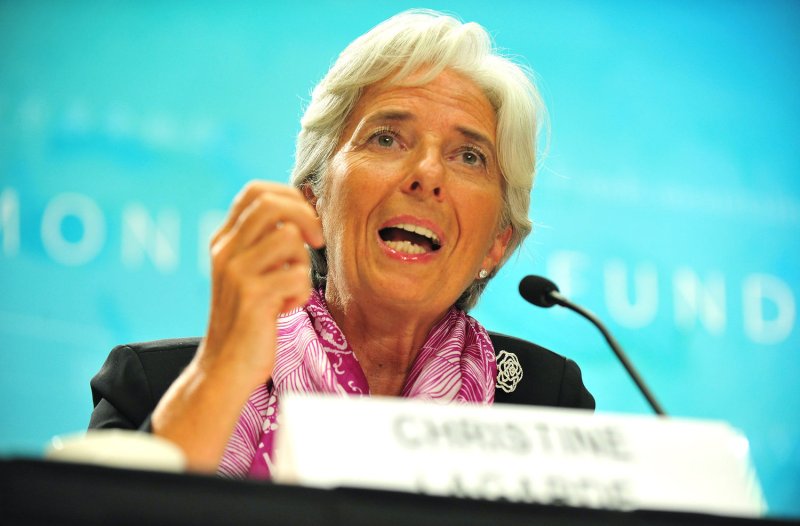1 of 3 | International Monetary Fund (IMF) Managing Director Christine Lagarde holds a news briefing at the IMF headquarters in Washington, D.C. on July 6, 2011. Lagarde is taking over control of the fund from her predecessor Dominique Strauss-Kahn who is facing sexual assault charges. UPI/Kevin Dietsch |
License Photo
WASHINGTON, July 6 (UPI) -- Under pressure on many fronts, Christine Lagarde used her first news conference as managing director of the International Monetary Fund to lay out her concerns and to suggest ways to shore up financial markets around the world.
When asked Wednesday about what worries her most, Lagarde, a former French finance minister, said the combination of sovereign debt concerns and the issue of capital flows -- massive influxes of investment to areas of the world that aren't prepared for it, and fear the effects on their economy -- are the "two immediate pressing issues."
The new IMF chief stressed that global recovery depends on action on current crises.
Lagarde urged the Greek political parties to make courageous decisions to fix its financial crisis following the cases demonstrated by political parties in Ireland and in Portugal.
"There comes a time when individual interests, political rivalries should be set aside when it's in the national interest of the country," Lagarde said.
Not willing to offer further comments on how the IMF plans to deal with Greece, Lagarde said she had a briefing scheduled on the issue and that the IMF board would debate the next round of aid -- $17.4 billion -- from last year's $160 billion rescue package to Greece on Friday.
"The memory of the IMF's mismanagement of the Asian finance crisis in the late 1990s still lingers, making the IMF's performance this time round all the more important for the long term reputation of the institution," said Christopher Kilby, an associate professor of economics at the Villanova School of Business.
Although Lagarde is the first woman to head the IMF since its foundation in 1944, she's the fifth pick from France and maintains the tradition that the post is held by a European.
"Her inside knowledge of European politics will help her craft her interaction with EU members in putting together a policy response," Kilby said. "However, these same deep European connections undermine her legitimacy in the eyes of non-European IMF member nations and, to a lesser extent, in the eyes of financial markets."
Lagarde will be running an institution that isn't only changing, but changing fast.
While the European economies are battling their crises, developing countries such as Brazil, India, China, and South Africa have been increasing financial support for the IMF and are asking for a greater share of voting power. Some argue that the next IMF chief should be from a developing economy.
"Lagarde will have to show that she has fully taken off her French finance minister hat and put on a global financial institution hat," said Kevin Gallagher, a professor of international relations at Boston University. "She will have to strike a delicate balance that on the one hand shows she is serious about the eurozone crisis but on the other shows that she recognizes that there are many other global challenges she is concerned with."
Following her appointment, Lagarde held out an olive branch to developing countries and said her "overriding goal" would be that the IMF "continues to serve its entire membership."
Global development group Oxfam said the IMF is badly in need of reform.
"To protect the institution's credibility, Lagarde will have to act to loosen Europe's stranglehold of the IMF Board and give others more of a voice," said Caroline Hooper-Box, acting head of Office and Essential Services Media Lead at Oxfam International.
"The influential role of first deputy managing director of the IMF, traditionally filled by a U.S. national, will fall vacant in August. And it's no longer tenable to have Europe and the U.S. dominate international financial institutions."
Lagarde responded to criticisms on the lack of diversity at the IMF at the news conference.
"We must complete the 2010 reforms, and governance and quotas must be readjusted to reflect the new architecture of the world," she said. "But that should also reflect in our employment policies, in our training policies, in the way in which we build teams, in the way in which we organize recruitment so that people are not clones of each other."















